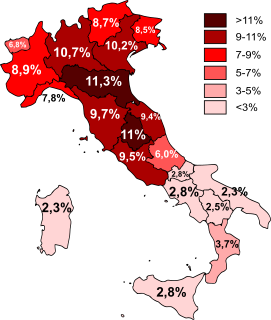Related Research Articles

As of 1 January 2017, there were 5,047,028 foreign nationals resident in Italy. This amounted to 8.2% of the country's population and represented an increase of 92,352 over the previous year. These figures include children born in Italy to foreign nationals, but exclude foreign nationals who have subsequently acquired Italian nationality; this applied to 129,887 people in 2014. Around 6,200,000 people residing in Italy have an immigration background. They also exclude illegal immigrants whose numbers are difficult to determine. In May 2020, The Times estimated them to number 600,000. The distribution of foreign born population is largely uneven in Italy: 59.5% of immigrants live in the northern part of the country, 25.4% in the central one, while only 15.1% live in the southern regions. The children born in Italy to foreign mothers were 102,000 in 2012, 99,000 in 2013 and 97,000 in 2014.

The Protector-class coastal patrol boats are a class of coastal patrol boats of the Maritime Squadron of the Armed Forces of Malta. They are 87-foot (27 m) patrol boats based on the Stan 2600 patrol vessel design from the Netherlands shipbuilding firm Damen Group. The Hong Kong Police were the first organization to order vessels based on this design. The United States Coast Guard (USCG) has 73 patrol boats of this class, where they are known as the Marine Protector class. Malta ordered two vessels, and they were built by Bollinger Shipyards to the USCG specifications. They were given pennant numbers P51 and P52. In 2013, both patrol boats were upgraded with new equipment including infrared cameras and a rigid hull inflatable boat. The new equipment cost €1.7 million and was co-funded by the European Union’s External Fund.
Arthur Neslen is a British-born journalist and author of two books about identity in the Middle East. Occupied Minds: A Journey Through the Israeli Psyche was published by Pluto Press in 2006 and In Your Eyes A Sandstorm: Ways of Being Palestinian was published by University of California Press in October, 2011. He is also the author of the booklet Gaza: Dignity Under Siege which was published by CIDSE in 2009. All three are collections of interviews and photographs.
Operation Mare Nostrum was a year-long naval and air operation commenced by the Italian government on October 18, 2013, which brought at least 150,000 migrants to Europe, mainly from Africa and the Middle East. The operation ended on 31 October 2014 and was superseded by Frontex's Operation Triton.
Assemble are a collective based in London who work across the fields of art, architecture and design. They began working together in 2010 and have described themselves as having between 16 and 20 permanent members. Assemble's working practice seeks to address the typical disconnection between the public and the process by which places are made. Assemble champion a working practice that is interdependent and collaborative, seeking to actively involve the public as both participant and collaborator in the ongoing realization of the work. Their socially responsible approach led them to win a Global Award for Sustainable Architecture in 2017.
Operation Sophia, formally European Union Naval Force Mediterranean, was a military operation of the European Union that was established as a consequence of the April 2015 Libya migrant shipwrecks with the aim of neutralising established refugee smuggling routes in the Mediterranean. The operational headquarters was located in Rome. The EU mandate for the operation ended on March 31, 2020. Operation Irini is the successor operation.

This is a timeline of the European migrant crisis from 2004 to the present. It lists migrant boat shipwrecking events from 2004–2015. From 2015 to the present, it also lists events connected with land migration and countries' political reactions related to the European migrant crisis.

Proactiva Open Arms is a Spanish NGO devoted to search and rescue (SAR) at sea. Set up in October 2015, it carried out its first rescue action that same month from its base on the Greek island of Lesbos.
Jugend Rettet is a non-governmental organization (NGO) from Berlin. Its goal is to save drowning persons at the Mediterranean Sea. Operations are conducted with the Iuventa, a ship that sails under Dutch flag. This ship was seized in August 2017 after suspicion of cooperation with migrant smugglers.

Forensic Architecture is a multidisciplinary research group based at the University of London that uses architectural techniques and technologies to investigate cases of state violence and violations of human rights around the world. The group is led by architect Eyal Weizman.
The UK Home Office hostile environment policy is a set of administrative and legislative measures designed to make staying in the United Kingdom as difficult as possible for people without leave to remain, in the hope that they may "voluntarily leave". The Home Office policy was first announced in 2012 under the Conservative-Liberal Democrat coalition. The policy was widely seen as being part of a strategy of reducing UK immigration figures to the levels promised in the 2010 Conservative Party Election Manifesto.

Extinction Rebellion is a global environmental movement with the stated aim of using nonviolent civil disobedience to compel government action to avoid tipping points in the climate system, biodiversity loss, and the risk of social and ecological collapse.
The Stansted 15 are a group of non-violent human rights activists who took action to stop a deportation flight leaving from Stansted Airport, UK on 28 March 2017. The plane, a Titan Airways Boeing 767 was chartered by the UK Home Office to deport 60 migrants to Ghana, Nigeria and Sierra Leone.The group were arrested, endured a ten week trial and later prosecuted in December 2018 under the 1990 Aviation and Maritime Security Act and convicted of terrorism related charges. During February 2019, they received suspended sentences or community orders after the presiding judge decided not to imprison them stating he believed the group had been motivated by "genuine reasons".

Pia Klemp is a ship captain, animal and human rights activist and author from Germany, who, between 2011 and 2017, worked for the Sea Shepherd organization to participate in many international operations to protect sea animals. Between 2016 and 2018 she commanded two rescue ships in the Mediterranean Sea for the German NGOs Jugend Rettet and Sea-Watch during the ongoing European migrant crisis. Her ships rescued about 14 thousand migrants from drowning. Klemp was responsible for the rescue of more than a thousand of them. One of her ships, the Iuventa, was seized by Italian authorities in 2017, who accuse her of cooperating with human traffickers, and claim many of those saved were at no imminent risk of death. If convicted, she faces 20 years in prison. Her newer ship, the Sea-Watch 3 was blocked by Maltese authorities for several months in 2018.

Carola Rackete is a German ship captain who works for the German sea rescue organisation Sea-Watch. In June of 2019, she was arrested for docking a migrant rescue ship without authorization in the port of Lampedusa, Italy.

Sea-Watch is a German non-governmental organisation that saves lives in the Mediterranean sea.
On 27 August 2015, the bodies of 71 illegal immigrants were discovered in a lorry on the Ost Autobahn in Burgenland, Austria. The victims were part of the wave of many thousands of migrants that were travelling through the western Balkans in an effort to reach Germany. The borders were opened shortly afterward to allow the influx across.

It Will Be Chaos is an HBO documentary on the European refugee crisis directed by US-based Italian filmmakers Lorena Luciano and Filippo Piscopo. In 2019 It Will Be Chaos won an Emmy Award for Outstanding Current Affairs documentary at the 40th News & Documentary Emmy Awards. It Will Be Chaos also won the Best Directing Award at the 2018 Taormina Film Festival. Translated into over 10 languages, the documentary has been distributed worldwide.

Barca Nostra was a project by Swiss–Icelandic artist Christoph Büchel that displayed at the 2019 Venice Biennale the wreckage of a fishing boat that had sunk with hundreds of migrants aboard. It was among the art world's top stories of the year and listed among 2019's best works of art.

Ingrid Persaud is a Trinidad and Tobago-born award-winning writer, artist, and academic, who now lives between Barbados and the United Kingdom. She won the BBC National Short Story Award in 2018, and the Commonwealth Short Story Prize in 2017, with her debut effort The Sweet Sop. The story is about a Trinidadian man reunited with his father, through chocolate.
References
- 1 2 Fullerton, Elizabeth (6 January 2019). "Political, forensic, hi-tech: how 'research architecture' is redefining art". The Guardian. ISSN 0261-3077 . Retrieved 2019-07-05.
- 1 2 Adams, Taylor; Ellick, Adam B. (23 January 2019). "How We Made an Invisible Crisis at Sea Visible". The New York Times. ISSN 0362-4331 . Retrieved 2019-07-05.
- 1 2 3 "The European Union's Lethal Maritime Frontier". Institute of Contemporary Arts. Retrieved 2019-07-07.
- ↑ "Forensic Oceanography". Visible. Retrieved 2019-07-07.
- 1 2 "Forensic Oceanography". Manifesta. 15 June 2018. Retrieved 2019-07-07.
- ↑ Shenker, Jack; Willsher, Kim (11 April 2012). "Migrant boat tragedy: UK crew may have seen doomed vessel". The Guardian. ISSN 0261-3077 . Retrieved 2019-07-05.
- ↑ "BBC World Service - The Documentary, The Left To Die Boat". BBC. Retrieved 2019-07-07.
- 1 2 Cumming, Laura (7 January 2018). "From Ear to Ear to Eye review – voices of battle and the bazaar". The Observer. ISSN 0029-7712 . Retrieved 2019-07-05.
- ↑ "Refugee rescue ships not colluding with smugglers, report finds". The Independent. 9 June 2017. Retrieved 2019-07-05.
- ↑ Searle, Adrian (20 June 2018). "Manifesta 12 review – plant sex, puppets and a dial-a-spy booth". The Guardian. ISSN 0261-3077 . Retrieved 2019-07-05.